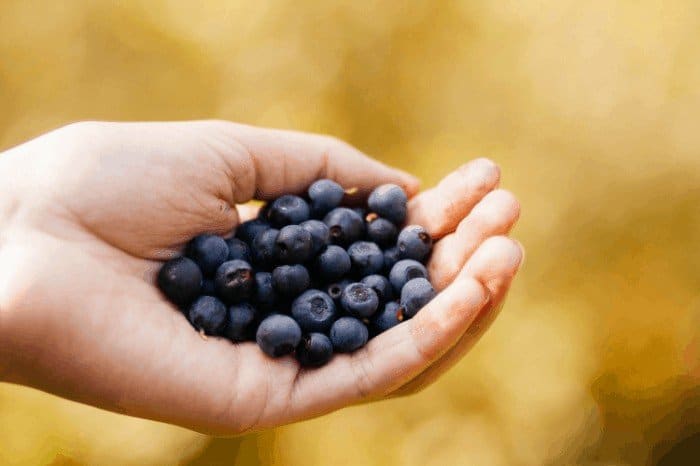Last Updated on January 26, 2022 by Cinthia
Growing berries is a lot easier when you know the type of fertilizer to apply to your plant. In this article, you will find out how to choose the best blueberry fertilizer. We will be looking at some of the things you need to know before you apply any fertilizer on your berry garden.
It doesn’t matter if you are an established berry farmer or you are just starting out a new blueberry garden, you will find the information in this article to be quite useful. Let’s jump right in.
Blueberry Fertilizer: Growing Blueberries
You can grow fresh blueberries in a pot or in your garden without much stress. When planting blueberries, it is important that you make use of soil that is resistant to diseases and pests. This you can easily do by making use of fertilizers that are equally good at deterring pests and diseases.
Planting blueberries are also a great way to beautify your backyard as they are attractive when they reach maturity. It is important that you know the different types of blueberries as this will help you when it’s time to select a suitable fertilizer. The four types of blueberries include the
- Rabbiteye
- High bush
- Low bush
- Hybrid half-high
Of the four types listed above, the high bush is the most common breed you can find around. Young blueberry plants between the ages of 12 and 36months are suitable for planting. This means that you will likely need to transplant them into your garden when you purchase them in nursery containers. The best time to plant blueberries is usually in the spring.
When using containers for your blueberries, you will need to make small holes for drainage and endeavor to water the plant regularly. Also, make sure that there are enough sunlight and proper ventilation to encourage healthy growth. Once you can get the planting requirements in order, it becomes easy to use fertilizers to support plant growth.
The three popular varieties of blueberries are a top hat, pink lemonade, and pink champagne. The pink varieties of blueberries are considered to be sweeter than the blue ones but both varieties are packed with antioxidants that are beneficial to the body.
As a blueberry farmer, it is important that you know that one of the major problems you will encounter in your garden is the invasion of birds. This is because hungry birds love to snack on blueberries; this is why you want to take preventive measures against birds as soon as possible. You can install a draping net to keep birds away from your bushes by simply placing them over your plants.
Once your bushes are older than 48 months, you will need to prune them regularly to encourage the growth of new shoots. The best time to prune your blueberries is before the beginning of the growing season which is in early spring or late winter.
The major pests and diseases of blueberries are birds, blueberry maggot, and powdery mildew.
The Best Blueberry Fertilizer
To ensure the healthy growth of your berry bushes, you will need to apply fertilizers regularly. Plants need the right amount of water, sunlight, alarmed nutrients to grow tasty fruits. And as a responsible farmer, it is your duty to make sure that everything is made available. Even when you do find the right fertilizer for your blueberries, you need to also make sure that you apply them at the right time.
When selecting fertilizers to use on your berry bushes, you need to check that they are rich in Nitrogen as well as ammonium. They also need to contain ammonium sulfate, urea, and sulfur coated urea. The rule is that blueberries are adaptable in soils with high acid content so you want to ensure that you use a high acid fertilizer to balance things out.
When choosing fertilizers with nitrogen for your blueberries, you want to ensure that you avoid those with nitrates like chloride and calcium nitrate. This is because nitrates have the potential to kill blueberry plants.
Blueberries also suffer from iron and magnesium deficiency. A good way to know your plant is deficient in these minerals is when the leaves turn yellow or reddish yellow in color. You can remedy the situation by applying fertilizers that are rich in these nutrients.
Blueberry Fertilizer: Choosing an Organic Fertilizer for Blueberries
It is always best that you avoid fertilizers with toxic chemicals that could harm your plants and the environment. This is why we always advise you use organic fertilizers on your plants. The best organic fertilizers for blueberries include
- Bone meal
- Fish meal
- Coffee grounds
- Sphagnum peat
- Powdered seaweed
Bone and fish meal are a good way to provide your blueberries with nitrogen. Adding coffee grounds or Sphagnum peat to your berries is a good way to provide acidity to your plant soil. While the powdered seaweed is rich in potassium and phosphorus which are nutrients your blueberry needs to grow healthily.
Best Fertilizer Application Method for Blueberries
Having mentioned that the best time to apply fertilizers to your blueberries is in early spring or late winter, you also need to know the best method of application to guarantee the best results. You need to apply fertilizers at the periods of plant growth and fruiting. The best way to apply your fertilizer is in small amounts applied at three separate times.
The first application should be done as soon as you notice new growth which is usually in early spring. Use small amounts of fertilizer and repeat the fertilizer application 6 weeks later after the first application. The final application will need to be done in late June or early July just after harvesting the fruits.
You should remember to apply just the right amount of fertilizer on your plant. Too much can be detrimental to your plants’ health. For example, too much nitrogen application on your blueberries can lead to excessive growth and branching which could hinder fruit production.
When it comes to choosing the best fertilizer for blueberries, you need to be on the lookout for the nitrogen content. Also, organic fertilizers are a much better option than chemical-based fertilizers. Bone meals and fish meals are a good organic source of nitrogen for your blueberries. And the best time to apply fertilizers is in early spring and late winter.
How often do you use fertilizers on your blueberries and how much do you use? We will like to hear from you in the comment section.
FAQs
Is triple 10 fertilizer good for blueberries?
Blueberries are sensitive plants that need to be grown in a specific environment. Some of the most common things you should avoid putting on blueberry plants are triple 10 fertilizer and weed killer.
Triple 10 fertilizer is a popular garden fertilizer that contains phosphorus. Blueberries, like many other plants, need phosphorus so they can create their leaves and flowers. Pesticides, herbicides, and insecticides should never be used near your blueberry plants because these chemicals will kill them and make the fruit unpalatable.
Blueberries are sensitive plants that need to be grown in a specific environment such as deserts or mountains, but some of the most common things you should avoid putting on blueberry plants are pesticides and herbicides along with weed killer.
How much fertilizer do blueberry bushes need?
Blueberries are a type of bush that can require a lot of fertilizer. Unlike other types of berries, blueberry bushes should be fertilized about four times a year. The amount of fertilizer you use for your blueberry bushes depends on the plant’s size and your location.
The amount of fertilizer needed varies depending on the variety of blueberries you are planting and their location. For example, spreading 1 lbs of 10-10-10 for every 4 ft of row space will be enough for some varieties.
Blueberries may not need any fertilizer if planted in full sun or in the shade. Fertilizer is always recommended because it speeds up the process of plant growth and can help during times when plants might not be getting enough nutrients from the soil's organic content.
What is the best organic fertilizer for blueberries?
Organic fertilizer is essential for healthy blueberries. It helps them grow bigger and more bountiful. Fertilizers have three main components: nitrogen, phosphorus, and potassium.
Nitrogen is what determines root yield; phosphorus leads to fruit production while potassium helps in fruit development.
Some recommend organic fertilizer while others claim that the best fertilizer for blueberries is compost made from plants in your garden that you have already grown.
The best organic fertilizer for blueberries is a mixture of compost, bone meal, blood meal, dolomitic limestone, liquid seaweed extract and rock phosphate.
Compost- It is rich in nitrogen and phosphorus while it has trace elements like calcium, magnesium, potassium and sulfur that benefit blueberry plants with its high pH value.
Blood meal- This organic fertilizer contains phosphorus which helps to fix nitrogen in soil while it also contains iron that can promote flower growth while it also helps to stimulate plant growth.
Dolomitic limestone- This nutrient acts as an alkaline agent that can help plants grow better.
How do you acidify soil for blueberries?
If you are planning to plant blueberries, it is important to know how to acidify the soil before planting. There are many ways to acidify the soil and here is one of them:
- Adding sulfur dioxide or iron sulfate directly into the ground
- Using a standard amount of lime (you can use up to 8 pounds per acre)
- Using a liquid fertilizer that contains ammonium sulfate, potassium nitrate, and magnesium sulfate
- Using a product specially made for acidifying soils.
Tony Manhart is a passionate gardener who has been tending to gardens for over 20 years. He takes pride in creating beautiful outdoor spaces with plants, trees, and shrubs that can thrive in any environment. He loves to share his knowledge with others and has taught classes on gardening basics and advanced techniques. He is committed to sustainability, using natural and organic methods to create and maintain gardens. He also works with local organizations to create green spaces for communities. When he’s not gardening, Tony enjoys hiking, reading, and spending time with his family.



